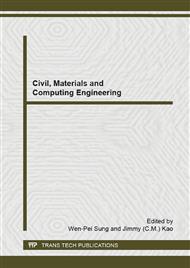p.135
p.140
p.144
p.148
p.152
p.156
p.160
p.166
p.170
Evaluation of Service Performance of Recycled SBS Modified Asphalt Pavement
Abstract:
Using the waste pavement materials can not only save resources such as bitumen and aggregate, but also reduce the pollution of environment. In this study, the high temperature performance and the moisture stability of recycled SBS modified asphalt mixture were evaluated by rutting test, immersion Marshall Test and freeze-thaw splitting routine test. In addition, the low temperature performance of recycled modified mixture was also analyzed by Fénix test whose operation was simple. The tests results illustrated that it was advantageous to improve the high temperature performance of recycled mixture and it has less influence on moisture stability with the addition of RAP. However, it had a significant adverse effect on the low temperature performance for recycled SBS modified asphalt mixture with a large quantity of RAP content. Therefore, it suggests that the RAP content for recycled SBS modified mixture is not too high.
Info:
Periodical:
Pages:
152-155
Citation:
Online since:
December 2014
Authors:
Price:
Сopyright:
© 2015 Trans Tech Publications Ltd. All Rights Reserved
Share:
Citation:


